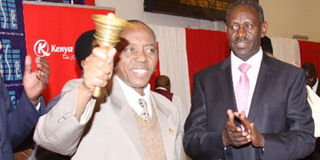State seeks control of Kenya Airways

Mr Joseph Kinyua, the Finance permanent secretary, rings the bell to officially start the listing and trading of Kenya Airways new shares earlier this year. It is not clear how the new shareholders of the airline will treat the move by the government to take greater control of the national carrier. Photo/FILE
What you need to know:
Who owns what at nation carrier:
- The Government of Kenya has two seats on the KQ board, represented by Transport PS Cyrus Njiru and Finance PS Joseph Kinyua.
- KLM’s two seats are occupied by Mr Rob Schipper and Mr Peter Hartman.
- After the rights issue, the Kenya government’s shareholding rose to 29.8 per cent, up from 23pc, while that of KLM increased marginally to 26.73pc, from to 26pc.
- The total Kenyan shareholding (government and local investors) has declined to 55.24 per cent from 62.8 per cent.
- However, kenya Airways still retains its national carrier designation as the minimum local shareholding required is 51 per cent
- Foreigners now have 44.76 per cent shareholding, compared with 37.20 per cent previously.
The government wants greater control of the management of Kenya Airways ahead of scheduled recruitment of the airline’s new boss after it became the largest shareholder in June.
It is understood that Treasury wants to take over the role of designating top executives at the airline, which has been a preserve of Dutch airline KLM, since it now has the largest stake in the airline.
Though both the government and KLM appoint two directors each to the 11-member board of Kenya Airways, the Dutch airline’s previous 26 per cent stake against Treasury’s 23 per cent gave it the right to designate KQ executives.
But after the airlines rights issue that ended on April 30, the government of Kenya toppled KLM to become the biggest shareholder, a position Treasury wants to use to have more clout at the airline.
The Kenyan government now has a 29.8 per cent stake in KQ, against KLM’s 26.3 per cent.
Bigger say
A source who declined to be named said that although the government is not interested in micro managing the airline since it is a public listed company, it wants to have a bigger say when it comes to approving who is hired, given that it is now the biggest shareholder.
“The hiring will be done by the board but whoever is hired should be approved by the main shareholders,” the source said.
The current edition of Paris-based intelligence magazine, Indian Ocean Newsletter says the move by the Kenyan government to seek greater control was occasioned by the recent retrenchment at the airline, which had the blessing of KLM.
“Nairobi wants to have a say in the choice of the airline’s top executives and is planning to replace its CEO, Dr Titus Naikuni, who has held that post since 2003,” said this week’s edition of the newsletter.
The magazine says the Kenyan government last month wrote to KLM to tell it of its intention to take over the management of Kenya Airways.
Attempts to get an official comment from both Treasury and KLM proved futile.
Finance minister Njeru Githae and his PS, Mr Joseph Kinyua, had not returned our calls, or answered text messages, by the time we went to press.
KLM, which had indicated that it would respond to an email, also had not done so by press time.
Board seats
The Kenyan government has two seats on the KQ board, represented by Transport PS Cyrus Njiru and Finance PS Joseph Kinyua. KLM’s two seats are occupied by Mr Rob Schipper and Mr Peter Hartman.
“Nine out of the 11 members of the board are non-executive, including the chairman of the board. All others, except the group managing director, group finance director and two KLM directors are subject to periodic reappointment in accordance with the firm’s Articles of Association,” the airline’s annual statement says in part.
It is not clear how the new shareholders of Kenya Airways (such as the International Finance Corporation, the lending arm of the World Bank, which bought a 9.56 per cent stake, estimated to be worth over Sh2 billion) will treat this move by the government.




